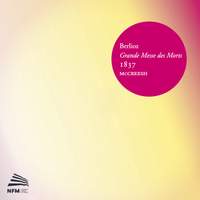Recording of the Week,
Berlioz's Grande Messe des Morts from Paul McCreesh
Dating from 1837, Berlioz’s Grande Messe des Morts was one of the composer’s most important works. He had always wanted to compose a setting of the Requiem text so when he received a commission he threw himself into the project with much enthusiasm. Its first performance earned the still relatively young composer much prestige (if not money) and although he only performed it twice more in his lifetime, he later said that if all but one of his works were to be consumed in a terrible fire, this would be the one he would save.
So what makes it such an amazing work and why is the new recording out today from Paul McCreesh and his Anglo-Polish musicians such essential listening?

Well, the scale of the piece is epic: calling for an orchestra including 16 timpani, bass drums, massed gongs and cymbals, four flutes, oboes and clarinets, eight bassoons, 12 horns, a string section of over 100, and a chorus of at least 210 singers. Oh, and did I mention the four separate brass ensembles positioned at the four corners of stage, one of which requires four ophicleides. The sound is immense, and there are one or two moments in this piece where the word apocalyptic does not feel out of place.
Yet despite this, the work has many tender and intimate passages, which feel deeply religious and quite moving. Berlioz demonstrates all his genius in orchestration, with hauntingly plaintive parts like the Quid sum miser (sound samples via the link below) scored for solo cor anglais, solo bassoon and male chorus, and the decision to use unaccompanied chorus for the Quaerens Me in the manner of a 16th century motet provides much contrast and repose compared to what comes before and after it.
Indeed, contrasts seem a central theme in the work, with operatic elements going against the deep religious aspect, high drama against stillness and reflection, and the most earth shattering tuttis against the quietist pianissimos.
Like in many of his works, a successful performance depends significantly on the ability to understand and communicate the composer’s remarkable sense of colour. Frequently scoring instruments in the extremes of their range or asking for unusual playing techniques, Berlioz achieves textures that are truly unique to him.
McCreesh’s orchestra is made up of wind and brass from the UK (Gabrieli players plus extras and members of the Chetham’s School of Music Symphonic Brass Ensemble), strings from Poland (including members of the Wroclaw Philharmonic Orchestra plus extras) and a choir made up of both nationalities. McCreesh has gone to significant efforts to use as many historic instruments as is practically possible, and this contributes significantly to the success of this recording. The variety of colours which the historic brass and percussion instruments achieve is astonishing: natural trumpets with their brilliantly open sound, narrow bore trombones with the clear attack, high and low horns in a wide variety of keys as well as more unusual instruments like French valved cornets and of course the ophicleides. Combined, the sound is noticeably different from modern instrument recordings, and all the more exciting because of it.
The tempos are generally fairly slow and weighty, but it never feels unduly held, and with the wonderfully warm and reverberant (yet still clear) acoustic of the St Mary Magdalene Church in Wroclaw, McCreesh’s speeds work perfectly. The chorus – singing in French Latin rather than the usual Italian Latin – are outstanding, singing beautifully throughout yet with real punch when required.
Released under the name ‘Winged Lion’ as a sort of sub-label on the established Signum records, this is the first of a series of new recordings which the Gabrieli Consort and Paul McCreesh will make, and those like me who so enjoyed their Elijah at the Proms this year will be pleased to know that it has already been recorded and should be released sometime next year.
But plenty of time to enjoy this one first. It comes with my highest recommendation, and I’d really urge you to explore it (particularly as it is in our 30% off offer at the moment!). Sound samples as usual below.
Gabrieli Consort and Players, Paul McCreesh
Available Formats: 2 CDs, MP3, FLAC



